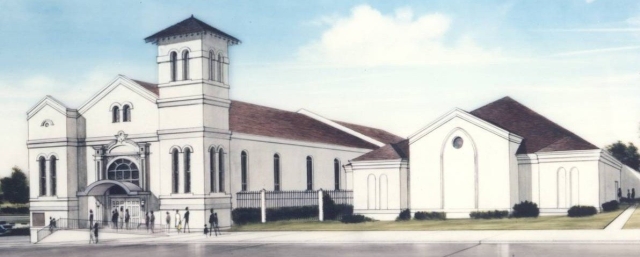Anyone who has worked on the religion beat for more than, well, a week knows that the membership statistics circulated by most mainstream religious organizations are rarely worth the paper on which they are printed.
For example, while there may, in fact, be 1.2 billion Catholics in this world of ours this tells us very little about the number of believers who are in Mass every week, who frequent the rite of Confession or who, as parents, would be truly enthusiastic if a son declared his intention to become a priest. Some statistics are more important than others.
Please trust me when I say that I am just as skeptical about the statistics indicating that the Eastern Orthodox churches around the world have somewhere between 200 and 300 million members, with 260 million being the most common estimate of this large, but in this land, rather obscure communion. And how large is the Orthodox flock in North America? You will find estimates between 1 and 6 million, with most insiders putting the number somewhere between 2 and 3 million in 2,000 or so parishes.
Fine. How many of those parishes are growing? How many have baptized any adults in the past year? How many have produced new priests in the past decade? And, to be blunt, how many of them have gone a year or two without a single new member whose conversion was rooted in religious conviction, as opposed to marrying into an Orthodox family?
I raise all of these statistics because it is easy, and true, to say that some kind of Orthodox presence is growing in North America. However, the reality is much more complex. There are patterns of growth and patterns of decay. Many of the statistics do not mean much and some of the statistics are more important than others.
But here is one statistic that is hard to avoid, especially on this day.
When the Lebanese-born Father Philip Saliba was raised to the episcopacy, becoming Archbishop of New York and Metropolitan of all North America, the Antiochian Orthodox Church had 66 parishes in this land. Now, a half century or so later, it has 275 churches and missions.
As a reporter, I trust the ability of religious leaders to accurately count congregations more than I trust their ability to count their active members.
At the very least, the legacy of Metropolitan Philip — who died last night after decades of fighting heart disease — must include the fact that he helped build a national flock of Orthodox believers.
But here is the key: While he was fiercely loyal to his brothers and sisters from Lebanon, Syria and Palestine, he opened the doors of his church to a river of American converts (I am one of them). These believers have had a major impact on Orthodoxy at the local, regional and national level, including — as much as anywhere else — in seminaries and, thus, at the faith’s altars. It’s hard to imagine what the face of Orthodoxy would look like in North America these days without his decision to embrace several thousand evangelicals in one fell swoop in the mid-1980s
Yes, Metropolitan Philip had many critics (including, now and then, me). Some people thought he changed too much too fast. Some people thought that he remained too wedded to the ways of the old world, including in the world of church finances, and should have made even more changes than he did. But no one doubted that in recent decades he was a force who had to reckoned with, especially when it came time to talk about building Orthodox parishes that were truly open to American converts.
So how big a news story is the passing of this Orthodox leader, in terms of coverage in the mainstream press?
I am probably not the best person to ask, for obvious reasons.
Truth be told, he was a controversial man with different people, for different reasons, both positive and negative. However, he was genuinely beloved in his church and anyone who knows anything about Orthodoxy in this land knows that he had a major impact here after arriving long ago as a young priest. Here is one early tribute, written by the conservative writer George Michalopulos at his Monomakhos (“one who fights alone”) weblog.
And here is the first coverage I have seen in the mainstream press, care of the International Business Times. It’s very thin, but did catch the detail — sort of — about the impact of the Evangelical Orthodox Church conversions. A sample:
Saliba, who held the titles of metropolitan and archbishop of New York and Metropolitan of All North America, had led his church since 1966.
Though born in Lebanon, Saliba worked to build his church, many of whose members come from or are descended from Christians in Syria, Palestine and Lebanon, into an authentically North American body that welcomed all races and ethnicities. He was instrumental in attracting large numbers of Anglicans, Episcopalians and evangelical Christians into the church.
There is so, so much more. Here is now I ended one 2005 column on his life and work:
The archbishop continues to tell familiar stories about life in the Middle East. He still asks second- and third-generation Arab children if they can speak Arabic.
But Philip said Eastern Orthodox Christians must embrace Americans who seek ancient roots in the confusion of modern times. This will mean learning from converts who are not afraid to use words like “missions,” “tithing” and even “evangelism.” …
Change will be difficult, but bishops must realize that they are called to spread their faith to others, not just to “to preserve it for ourselves,” he said. The heart of Orthodoxy must stay the same, but it is not enough to “put our faith into pickle jar and preserve it. We have enough pickles in America already.”
Orthodox leaders will find a way to save the traditions of their homelands, said Philip. But the clergy and laity must realize that their own children and grandchildren are Americans who need a faith that is stronger than old music, familiar foods, folk dancing and traces of an ancient language.
“I believe in Orthodox unity, with diversity,” he stressed. “We will not melt into the Greek archdiocese and the Greeks will not melt into our archdiocese. … But we must have a united synod that speaks to this country. We must speak to America, not as Arabs and Greeks and Russians and Romanians and Bulgarians. We need to speak with one Orthodox voice on the issues that affect our country and our country is America.”
Memory eternal, master. Memory eternal.











